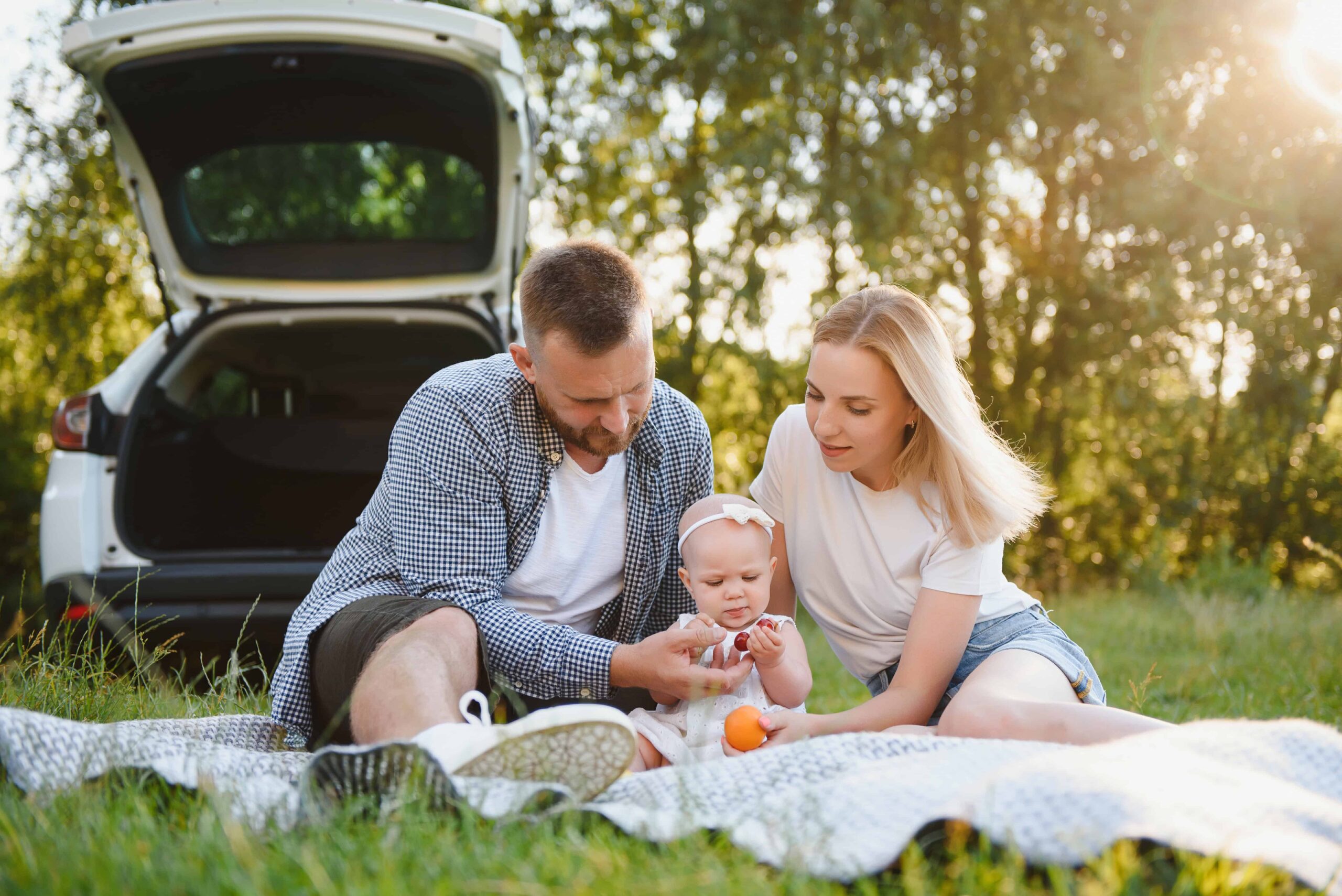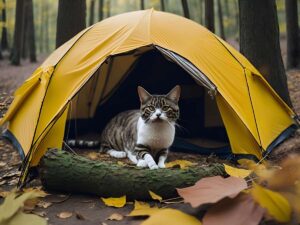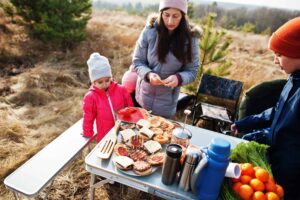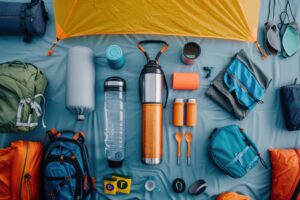Camping is more than just a getaway; it’s an opportunity to create lasting memories and introduce your little one to the wonders of nature.
If you’re a parent considering a camping trip with your baby, you might feel both excited and a bit anxious. Rest assured, with the right preparation and mindset, camping with a baby can be a rewarding experience for the whole family.
This comprehensive guide offers detailed tips and advice to help you plan a successful and enjoyable camping adventure.
1. Stay Close to Home for Your First Trip
Why Proximity Matters
Choosing a campsite near your home for your first outing has several advantages. It reduces travel time, which can be less stressful for your baby, and provides peace of mind knowing that you can return home quickly if needed. Being close to familiar surroundings can also make the experience less overwhelming for both you and your little one.
Tips for Selecting a Nearby Campsite
- Research Local Campgrounds: Look for campsites within a one to two-hour drive.
- Check Amenities: Ensure the campsite has facilities like clean restrooms and running water.
- Read Reviews: Other parents might have shared their experiences camping with kids at these sites.
2. Keep the Trip Short but Sweet
Starting Small
Begin with a one or two-night trip to test the waters. Short trips allow you to gauge how your baby adapts to the new environment without committing to a longer stay.
Benefits of a Short Trip
- Less Packing Stress: Fewer days mean less gear to bring.
- Flexibility: Easier to adjust plans if things don’t go as expected.
- Learning Experience: Helps you identify what works and what doesn’t for future trips.
3. Choose a Family-Friendly Campsite
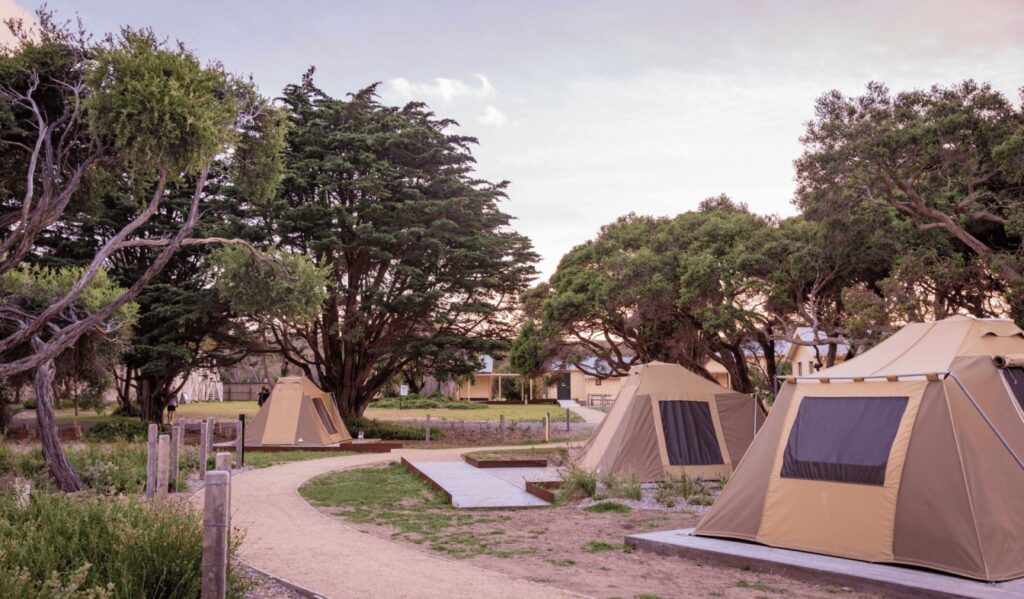
What to Look For
Not all campsites are created equal, especially when camping with a baby. Family-friendly sites offer amenities and environments conducive to a comfortable stay.
Key Features of a Family-Friendly Campsite
- Accessible Facilities: Clean bathrooms, showers, and potable water.
- Safe Environment: Flat terrain, shaded areas, and safe distances from hazards like rivers or cliffs.
- On-Site Activities: Playgrounds, nature trails, or organized activities for children.
How to Find Them
- Online Platforms: Websites like ReserveAmerica or recreation.gov allow you to filter campsites based on amenities.
- Recommendations: Ask friends or family who have camped with kids for suggestions.
- Campground Reviews: Read up on experiences from other families.
4. Do a Backyard Test Run
The Importance of a Trial Run
Setting up camp in your backyard can help your baby get accustomed to sleeping outdoors and familiarize yourself with the camping gear.
Steps for a Successful Backyard Campout
- Set Up the Tent: Practice pitching your tent and arranging sleeping areas.
- Simulate Camping Conditions: Use sleeping bags and camping mats instead of indoor bedding.
- Observe Your Baby’s Reactions: Note any discomfort or issues that arise, such as temperature preferences or reactions to outdoor noises.
5. Pack Wisely: What to Bring
Essential Gear for Camping with a Baby
Packing smart ensures you have everything you need without overloading yourself with unnecessary items.
Sleeping Arrangements
- Portable Crib or Bassinet: Choose one that’s easy to assemble and fits inside your tent.
- Safe Co-Sleeping Options: If you prefer co-sleeping, bring a co-sleeping pad designed for camping.
Diapers and Wipes
- Quantity: Pack at least 25% more than you think you’ll need.
- Storage: Bring sealable plastic bags for used diapers if disposal facilities are not available.
Clothing Layers
- Variety of Layers: Include onesies, sleepers, jackets, and hats.
- Weather-Appropriate: Pack for both warm days and cool nights.
Baby Carrier
- Comfortable Fit: Ensure the carrier supports both you and your baby comfortably.
- Versatility: Consider carriers that can be used for both front and back carrying.
Favorite Toys and Comfort Items
- Familiar Objects: Bring items like a favorite blanket or stuffed animal to provide comfort.
- Portable Entertainment: Small toys or books can keep your baby occupied.
First Aid Kit
- Baby-Specific Supplies: Include infant acetaminophen, a digital thermometer, and any prescribed medications.
- General Supplies: Band-aids, antiseptic wipes, tweezers, and sunscreen.
Sun and Bug Protection
- Baby-Safe Sunscreen: Choose a formula suitable for your baby’s age.
- Insect Repellent: Use repellents approved for infants or consider natural alternatives like citronella.
6. Keep Meals Simple and Frequent
Feeding in the Great Outdoors
Your baby may get hungrier due to increased activity and fresh air. Planning meals and snacks is crucial.
Tips for Feeding
- Breastfeeding: Find a comfortable, shaded spot. A nursing cover can provide privacy if desired.
- Formula Feeding: Bring pre-measured formula and bottled water. Consider using disposable bottles for convenience.
- Baby Food: Pack pouches or jars that don’t require refrigeration. Remember a spoon and bib.
Meal Preparation
- Easy-to-Prepare Foods: Choose meals that require minimal cooking, like oatmeal or pasta.
- Snacks: Bring along finger foods like cereal puffs or soft fruits if your baby is eating solids.
7. Stick to Your Baby’s Routine
The Comfort of Consistency
Maintaining your baby’s regular schedule for naps and bedtime can help them feel secure.
How to Maintain Routine
- Set Alarms: Use your phone to remind you of nap and feeding times.
- Familiar Rituals: Read a bedtime story or sing a lullaby just as you would at home.
- Quiet Time: Create a calm environment before naps to signal it’s time to rest.
8. Create a Comfortable Sleeping Environment
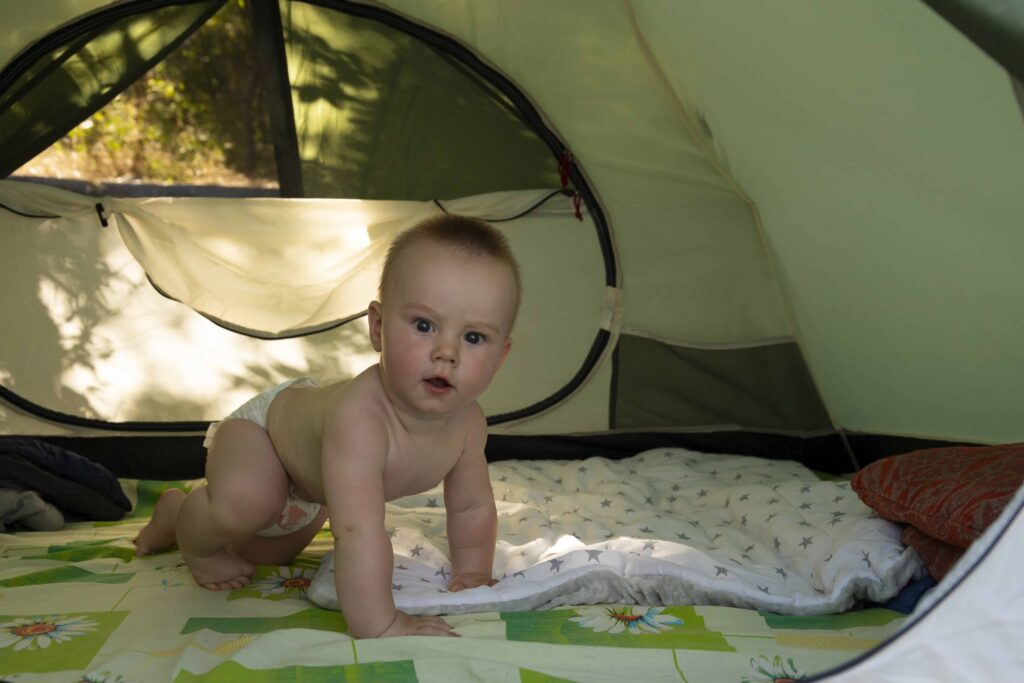
Ensuring Quality Sleep
A well-rested baby is a happy baby. Pay special attention to their sleeping setup.
Setting Up the Sleeping Area
- Tent Placement: Pitch your tent on a flat, shaded area to avoid morning sun overheating the tent.
- Bedding: Use familiar sheets and blankets. Consider bringing a sleep sack if your baby uses one.
- Noise Reduction: Use a portable white noise machine or app to drown out unfamiliar sounds.
9. Dress Your Baby in Layers
Adapting to Temperature Changes
Weather can be unpredictable. Layering helps keep your baby comfortable throughout the day.
Layering Tips
- Base Layer: Start with a lightweight, moisture-wicking onesie.
- Middle Layer: Add a sweater or fleece for warmth.
- Outer Layer: Include a waterproof jacket if rain is forecasted.
- Accessories: Don’t forget hats and mittens for cooler evenings.
10. Embrace Babywearing
Benefits of Using a Baby Carrier
A baby carrier is invaluable for keeping your hands free and your baby secure.
Choosing the Right Carrier
- Comfort: Look for padded straps and good weight distribution.
- Breathability: Mesh panels can help keep both you and your baby cool.
- Ease of Use: Practice putting it on and taking it off before your trip.
When to Use It
- Hiking: Navigate trails without worrying about stroller accessibility.
- Around the Campsite: Keep your baby close while setting up camp or cooking.
11. Plan for Diaper Changes
Staying Clean and Hygienic
Diaper changes can be challenging outdoors but planning ahead makes it manageable.
Setting Up a Changing Station
- Portable Changing Pad: Waterproof and easy to clean.
- Organized Supplies: Keep diapers, wipes, and creams in a dedicated bag.
- Disposal Plan: Use sealable bags to contain odors and store used diapers until you can dispose of them properly.
12. Stay Safe and Vigilant
Prioritizing Safety
Your baby’s safety is paramount. Being aware of your surroundings and potential hazards is essential.
Safety Tips
- Campfire Caution: Keep a safe distance and never leave your baby unattended near a fire.
- Wildlife Awareness: Store food securely to avoid attracting animals.
- Sun Protection: Use a canopy or umbrella to provide shade during peak sun hours.
13. Keep Insects at Bay
Protecting Your Baby from Bugs
Insect bites can be more than just irritating; they can carry diseases.
Preventative Measures
- Appropriate Clothing: Long sleeves and pants made of lightweight fabrics.
- Mosquito Netting: Use over strollers, carriers, or the sleeping area.
- Natural Repellents: Consider options like citronella bracelets or essential oil blends suitable for babies.
14. Pack Extra Everything
Being Prepared for the Unexpected
Babies are unpredictable, and it’s better to have too much than too little.
Items to Double Up On
- Clothing: Expect outfit changes due to spills, dirt, or weather changes.
- Bedding: Extra blankets in case one gets dirty or wet.
- Food and Water: Bring more than you anticipate needing.
15. Keep Your Baby Entertained
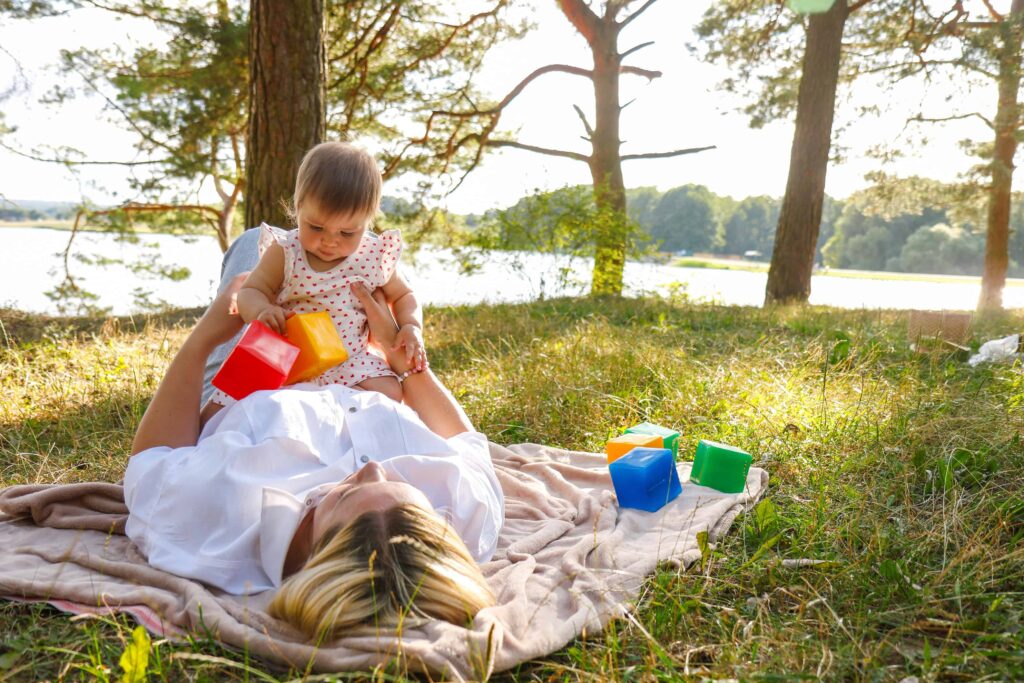
Engaging Your Little One
New environments can be both exciting and overwhelming for a baby.
Entertainment Ideas
- Outdoor Exploration: Let your baby touch leaves, watch birds, or feel the grass.
- Interactive Toys: Bring toys that stimulate senses, like rattles or soft books.
- Songs and Stories: Singing and storytelling can soothe and entertain.
16. Be Prepared for Weather Changes
Staying Ahead of Mother Nature
Weather can shift unexpectedly, especially in certain regions.
Preparation Tips
- Check Forecasts: Monitor weather updates before and during your trip.
- Rain Gear: Pack waterproof jackets, boots, and a rain cover for your tent.
- Sun Protection: Hats, sunglasses, and sunscreen are essential.
17. Relax and Enjoy the Experience
Embracing the Adventure
It’s important to stay flexible and not let small hiccups ruin your trip.
Mindset Tips
- Set Realistic Expectations: Understand that not everything will go perfectly.
- Take Breaks: Allow downtime for yourself to rest and recharge.
- Capture Memories: Take photos or keep a journal of your experiences.
18. Embrace the Mess
Letting Go of Perfection
Camping is inherently messy, and that’s okay.
Why Mess Is Part of the Fun
- Sensory Exploration: Allowing your baby to interact with nature aids development.
- Stress Reduction: Accepting mess can make the experience more enjoyable.
- Easy Cleanup: Pack extra wipes and accept that a thorough bath can wait until you get home.
19. Consider Co-Sleeping Options
Nighttime Convenience
Co-sleeping can make nighttime feedings and comforting easier.
Safe Co-Sleeping Practices
- Use Barriers: Co-sleeping bassinets or in-tent cribs keep your baby safe.
- Avoid Loose Bedding: Keep pillows and heavy blankets away from your baby.
- Stay Sober: Ensure that any adults sharing the sleeping space have not consumed alcohol or medications that cause drowsiness.
20. Remember That Babies Are Resilient
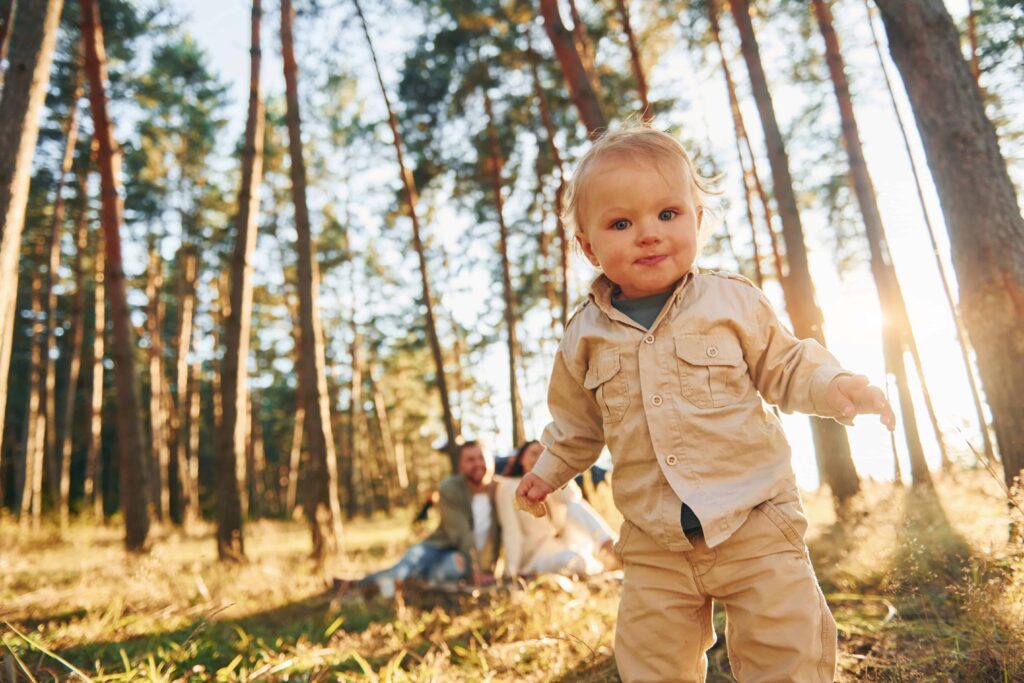
Confidence in Your Baby’s Adaptability
Children often adjust more easily than adults to new experiences.
Encouraging Adaptability
- Positive Attitude: Your baby can sense your emotions; staying positive helps them feel secure.
- New Experiences: Exposure to different environments can aid in development.
- Building Immunity: Time outdoors can strengthen your baby’s immune system.
Camping with a baby requires extra planning and patience, but the rewards are immense. From the joy of watching your child discover the wonders of nature to the quality family time away from daily distractions, these experiences are priceless.
By following these detailed tips and embracing the adventure with an open heart, you’re setting the stage for many more family camping trips to come. So pack your bags, prepare for the unexpected, and get ready to make unforgettable memories under the stars.

